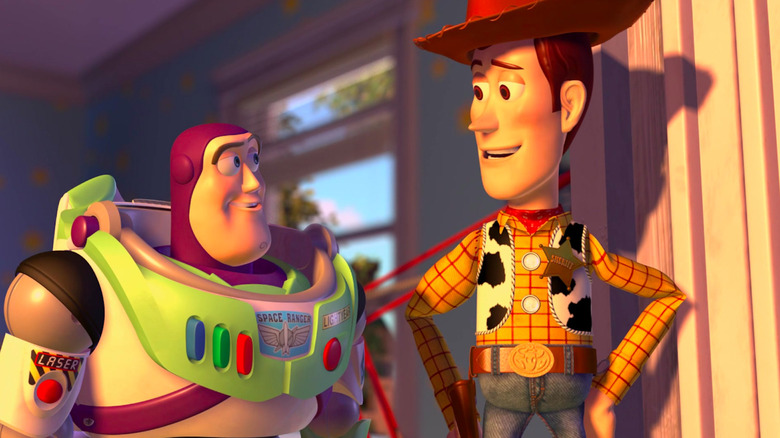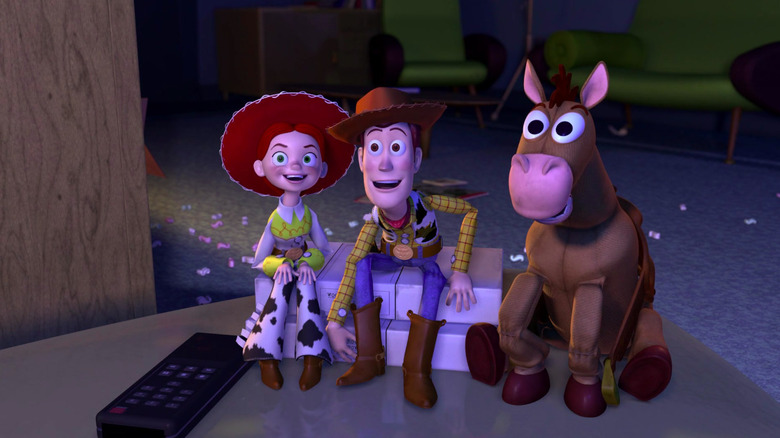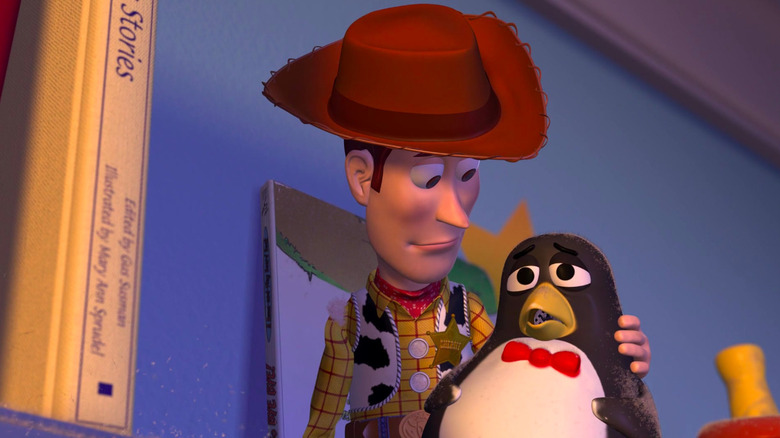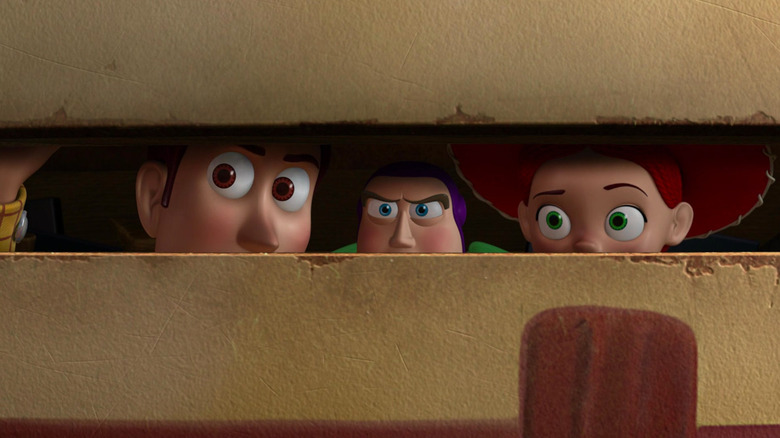Toy Story 2 Ending Explained: A Moving Allegory For The Stages Of Life
When Pixar's "Toy Story" first hit theaters in 1995, it was pure magic. Making close to $30 million during its opening weekend, the film went on to inspire a full-on franchise with "Toy Story 2" coming out four years later. Today, there are three true sequels to the original film, as well as the recently released spin-off, "Lightyear," that serves as the actual movie that the Buzz Lightyear toy is supposed to be based on. (Think of it as the Buzz version of "Woody's Roundup" if "Woody's Roundup" had gotten its own actual movie.)
With so many sequels to its name, "Toy Story" has become a Disney and Pixar creation that is truly beloved by people of all ages, and while each one of the sequels has its merits, the second installment in the series really sets the bar high as far as follow-ups are concerned.
"Toy Story 2" is one of those rare sequels in that, at times, it almost feels like it's even better than its predecessor. The movie is so adept at taking what everyone loved about the first film — toys with hearts of gold and clever in-jokes for the parents — and building upon the toys' universe in truly unique and exciting ways. If "Toy Story" shows the toys in their childhood era, then "Toy Story 2" sees them experiencing a coming of age, journeying into an adolescent phase where their lives are no longer just about playing favorites and making friends. But is this logical character growth by design, and if so, does "Toy Story 2" foreshadow the heartbreak to come in "Toy Story 3?" Let's take a look at its ending and see.
An optimistic ending?
"Toy Story 2" introduces two new very important characters: Jessie the Cowgirl and Bullseye, Woody's faithful steed. Prior to his adventures in "Toy Story 2," Woody had no idea that he was actually part of a group of toys based on an old '60s television show called "Woody's Roundup." After being accidentally purchased at a yard sale by a greedy toy collector named Al, Woody meets and befriends the rest of the Roundup gang — including Pete the Prospector — as Al prepares to ship all of them off to Japan to be displayed in a museum. Of course, the rest of Andy's toys are determined to not let this happen, so they concoct a rescue mission that ends with Woody convincing Jessie and Bullseye to come live with them and be a part of Andy's life.
In the movie's final scene, Andy, who has just returned home from cowboy camp (because apparently, that's a thing), is overjoyed to find Jessie and Bullseye amongst his toys. He thanks his mom (who probably should be at least a little concerned that two new toys just randomly showed up in her house. Obviously, Ms. Davis isn't the type to report unattended and suspicious-looking baggage at the airport), and effortlessly incorporates the new toys into his playtime.
Eventually, the toys are left alone to reminisce about their recent adventure, and as Wheezy performs the movie's theme song, Buzz and Woody discuss their futures. Buzz asks if Woody is still worried about what will happen once Andy outgrows them all, but Woody is no longer concerned. "It'll be fun while it lasts," says Woody. "Besides, when it all ends, I'll have ol' Buzz Lightyear to keep me company."
Coming of age
"Toy Story 2" revolves heavily around the toys' anxieties about their fates as Andy's playthings. Woody is particularly shaken when his arm is accidentally ripped during play, forcing Andy to leave him behind on his way to camp. Woody is prematurely "shelved" by Andy's mom who solemnly tells her son that, "Toys don't last forever" (thanks a lot, Ms. Davis). While shelved, he gets reacquainted with Wheezy, a toy penguin with a broken squeaker who has been forgotten about. Wheezy tells Woody, "What's the point in prolonging the inevitable? We're all just one stitch away from here to there," as he points to a yard sale going on outside. Thus, the existential dread of "Toy Story 2" is born.
If "Toy Story" is a movie about jealousy and friendship, then "Toy Story 2" finds its stride in tackling the inevitable: death. Prior to the start of "Toy Story 2," Woody's concerns about falling out of favor only revolved around the possibility of being replaced with a shinier, newer toy (i.e. Buzz Lightyear). This mindset is fairly juvenile, failing to recognize that a child can have more than one favorite. But in the sequel, much like Andy, Woody and the toys are on the brink of adolescence. Suddenly, they are becoming aware of their own mortality, and this realization shakes them to the core of their AA batteries and pull strings.
"Toy Story 2" is a coming-of-age story that asks the big question, what do we do with the time that's given to us? In the case of Andy's toys, they decide to just enjoy it (i.e. life) while it lasts. It's true that one day they may be relegated to the yard sale (their deaths), but until that moment comes, they're going to have one hell of a time playing it up.
Foreshadowing and what comes next
The end of "Toy Story 2" lightly foreshadows the premise of "Toy Story 3." When Buzz asks Woody if he's still worried about Andy growing up and moving on, what he's really doing is setting the stage for the next film in the series. If you've seen "Toy Story 3," then you know the film begins with Andy's toys in a state of despair. They have not been played with for years, a direct result of Andy inevitably growing up and moving on. Their biggest fear of being abandoned by their favorite child has finally occurred, and the toys have now entered into what can be viewed as old age.
If "Toy Story 2" is a coming of age for Andy's toys, then "Toy Story 3" is set up to be a reflection on their time with Andy at the end of their lives. By the film's end, they do end up experiencing a rebirth (as the new toys of neighborhood child Bonnie), but the majority of the movie centers around Woody and his friends coming to terms with their longevity as Andy's toys. Each installment in the "Toy Story" franchise can be seen as reflective of the stages of life a person goes through from childhood to old age. Even "Toy Story 4" focuses on what might be considered a more middle-aged experience of losing one's way.
Ultimately, the "Toy Story" movies have always been about so much more than just toys having adventures. They all cleverly speak to the trials and tribulations of growing up.



